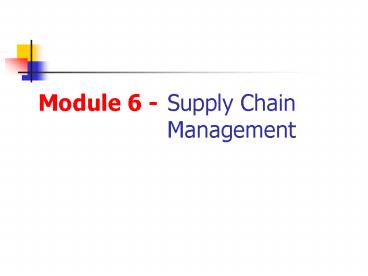Module 6 Supply Chain Management - PowerPoint PPT Presentation
1 / 17
Title:
Module 6 Supply Chain Management
Description:
1. Describe an overview of supply chain management. 2. Describe information sharing ... can outsource the manufacturing of its surfboards for $50 for each board and a ... – PowerPoint PPT presentation
Number of Views:38
Avg rating:3.0/5.0
Title: Module 6 Supply Chain Management
1
Module 6 - Supply Chain Management
2
Course Framework
- 1. Cost
- - Design Selection
- 2. Quality
- - TQM
- - SQC
- 3. Speed
- - Project Management
- - Supply Chain
- 4. Flexibility
- - Inventory
- - Location
- - Forecasting
- - Aggregate Planning
3
Learning Objectives
- 1. Describe an overview of supply chain
management - 2. Describe information sharing
- 3. Analyze insourcing vs. outsourcing decisions
- 4. Describe the role of virtual organizations
- 5. Describe the role of vertical integration
4
1. Overview
- A supply chain is a network of activities that
deliver a product/service to a customer - Supply Chain Management is the business function
that coordinates all network links - Coordinates movement of goods
- Promotes information
5
A Basic Supply Chain
6
1. Overview (continued)
- Several factors have emerged that now require
companies to use supply chain management as part
of their competitive strategy - Globalization
- Increased competition
- Information technology
- Shorter product life cycles
7
1. Overview (continued)
- Globalization has led to new markets
- At the same time it increases competiton
- One way to win market share is introducing new
products - Leads to shorter product life cycles
- This all leads to increased emphasis on having an
appropriate supply chain management strategy.
8
2. Information Sharing
- Phase 1
- Companies kept all information secret.
- Phase 2
- Information sharing between adjacent supply chain
pairs - Limited amounts
9
A Basic Supply Chain
10
2. Information Sharing (cont.)
- Both the Phase 1 and Phase 2 strategies of
limited or no information sharing leads to the
bullwhip effect. - Bullwhip effect Inaccurate, distorted
information flow through the chain - Causes erratic order replenishment, poor customer
service, and lost revenues - To reduce the bullwhip effect, supply chains use
a hub and spoke approach to sharing information.
11
A Basic Supply Chain
12
3. Insourcing vs. Outsourcing
- Critical issues to resolve first
- Critical to firms success?
- Core competency?
- Effect on lead times and flexibility?
- Less cost and better quality?
13
3. Outsourcing vs. Insourcing (cont.)
Total Cost of Buying (Outsourcing) TCOutsourcing
FCOutsoucing (VCOutsourcing ? Q)
Total Cost of Making (Insourcing) TCInsourcing
FCInsoucing (VCInsourcing ? Q)
Indifference Point FCOutsoucing (VCOutsourcing
? Q) FCInsoucing (VCInsourcing ? Q)
14
3.Outsourcing vs. Insourcing (cont.)
- Outsource A small snowboard manufacturing
company can outsource the manufacturing of its
surfboards for 50 for each board and a fixed
cost of 25,000. - Insource Alternatively, they can reduce their
in-house variable cost to 20 each, but would
increase their in-house fixed cost to 400,000.
15
3. Outsourcing vs. Insourcing (cont).
- Indifference Point
- FCOutsourcing (VCOutsourcing ? Q)
FCInsourcing (VCInsourcing ? Q) - 25,000 (50 ? Q) 400,000 (20 ? Q)
- 30 Q 375,000
- Q 12,500 units
- gt 12,500 ? Use Insource
- lt 12,500 ? Use Outsource
16
4. Virtual Organizations
- Outsourcing is gaining popularity
- Cost advantages coordination opportunities
- Virtual organizations (corporations)
- Exist only as an administrative shell
- All other functions outsourced
17
5. Vertical Integration
- Backward vertical integration
- Company owns suppliers
- Forward vertical integration
- Company own distribution systems and retail
outlets that sell their products - Integration helps companies get close
coordination in their supply chain































